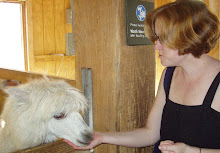It is late, well after midnight, when George and Martha return to there home from a faculty party at the small New England college at which George is a history professor. They have been drinking heavily and are already slightly befuddled when Martha announces that she has invited a new couple over for a post-party get together. The new couple happens to be the new, young, hot shot biology teacher and his "slim-hipped" wife.
Martha is 52 "looking somewhat younger. Ample but not fleshy".
George is 46 "thin, hair going grey."
Honey is 26 "a petite blond girl, rather plain"
Nick is 30 "well put together, good looking"
Martha is the daughter of the college President. George was once the new stud on campus and Martha (and presumably her father?) intended to groom him for the presidency, but George (for one reason or another) was not up to snuff. George and Martha are a well educated couple. To them, words are a blood sport. They are witty, brash and highly literate. George speaks Latin and both George and Martha know at least enough French and Spanish to verbally assault one another.
George and Martha are steeped in the academic world. They read. They lead academic lives, although I suspect Martha is left rather unsatisfied by simply playing wifey to a college professor. She is intelligent in her own right, but seems to have little outlet for her energies beyond berating her all-too-patient husband, her many daliences with an odd assortment of men, and the fictional life that she and George seem to have written together. This is the central puzzle of the play. Why have they created a fictional son? Why reveal it now? Why do they expose themselves in this way to this particular couple? Why toy with Nick and Honey? What the hell is this play about, anyway?
Both couples are childless and this might be the 800 lb gorilla copulating with the proverbial elephant in the room. Martha seems to be unable to conceive (as an actor that will be my choice) and Honey seems unwilling. Nick is a reluctant husband. George suffers abuse from Martha. Nick's true feelings for Honey are questionable and Honey seems along for the ride. Martha and George are deeply devoted to one another, but Martha is obliged to punish him. In Act 3 she says:
...whom I will not forgive for having come to rest; for having seen me and having said; yes, this will do; who has made the hideous, the hurting , the insulting mistake of loving me and must be punished for it. George and Martha: sad, sad, sad... who tolerates, which is intolerable; who is kind, which is cruel; who understands, which is beyond comprehension...
Martha barrels through the text as a monstrous, destructive animal. She is willing to destroy herself, her husband, her reputation, her marriage, Nick and Honey's marriage... she has the air of a caged animal ready to go berserk. She uses sex as a tool of destruction. Meanwhile, George, though just as caustic and destructive, seems to be attempting to hold his world and his wife together. He berates Nick and seems disgusted by Honey but he attempts to share his wisdom and life experience with them. He warns them repeatedly, though it is difficult to heed the warnings couched in insults and condescension.
In the end, George seeks to destroy that which has previously held his life and his marriage together- his fictional son. It is as if total annihilation is the path to salvation. Perhaps it is? Albee leaves this for the audience to consider.
As with all good drama, there are dozens more circumstances to pull apart and piece back together again. Everyone's relationship to Martha's father, the college president, looms rather ominously throughout the text. George and Martha's rather sketchy relationship to "truth" is another. While these (and other) circumstances are integral to the play, this is a good place to start. Now is the time for me to begin to bring myself closer to the text by exploring what I know about these circumstances. By placing myself "inside" the text (as opposed to an academic analysis from the "outside") I will start to identify with Martha. After all, that is my job.
As I look at Martha, my first job is to relate to her- to empathize with her. I do not have a set "outside-in" or "inside-out" methodology. I like to let the role dictate which tools I should use. In this instance I feel I should work on Martha physically first. Martha is animalistic, she is comfortable with her body and she uses it to advance her objectives. I...do not. Since this will be a huge hurdle for me (feeling rather terrible about my post-baby, post-tragic H&M shopping excursion body!) I think this will be a good place for me to begin. If I don't unlock the keys to Martha's physicality early, I will be lost when it comes to making those words come out of my mouth in a believable fashion. I will begin by memorizing a chunk of text and using it in a series of physical exercises which I will detail here as best I can.
Uh oh. Baby awake...



No comments:
Post a Comment